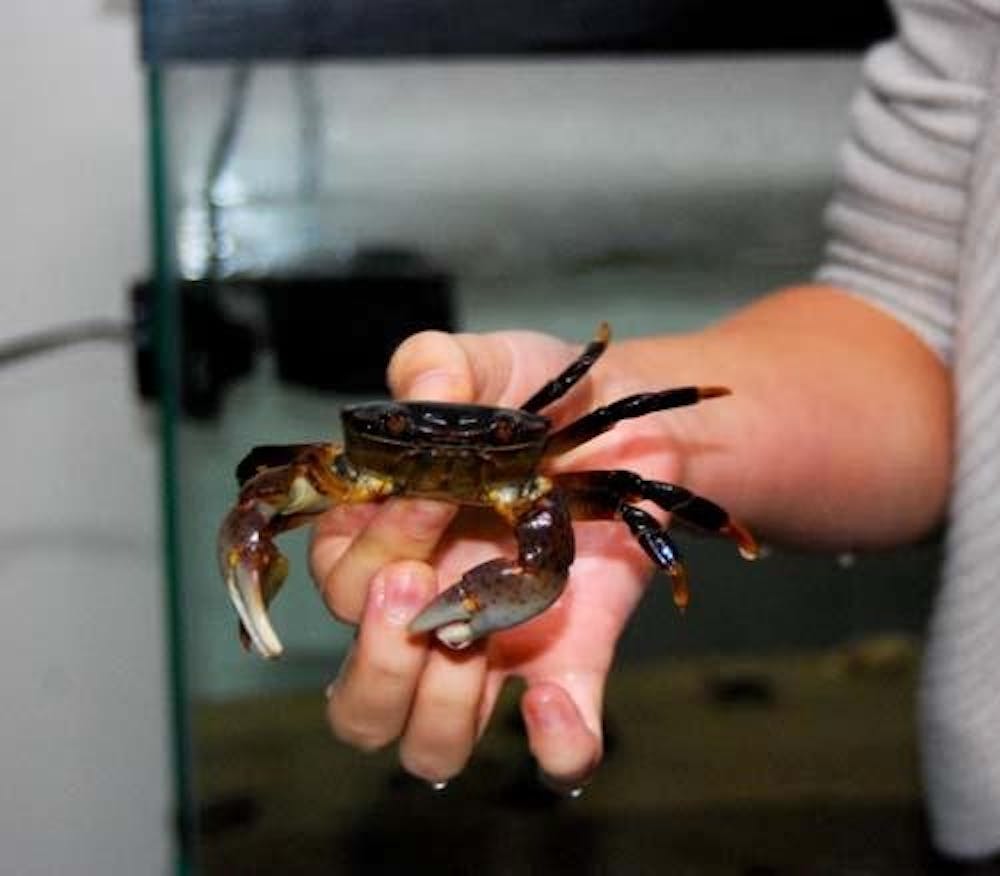Friday Sept. 28, Crab Lab will have an open house to showcase two students’ summer projects
Seniors Tim Luethke and Matt Ortman collected real ocean specimens this summer to research. (Photo courtesy of Tara Maginnia)
By Hannah Kintner, Staff Writer kintner13@up.edu
So you spent your summer at the beach? So did seniors Tim Luethke and Matt Ortman, but they got to bring the beach back to school with them.
Over the summer, Luethke and Ortman worked with biology professor Tara Maginnis as Crab Lab interns. Crab Lab is a research program Maginnis started where students can study animal limb regeneration and animal behaviors.
The lab was set up last year and mainly focused on crab research. The program was expanded this year when Luethke and Ortman took it upon themselves to create miniature ecosystems in each of the holding tanks so they can take their research to a new level.
"We've taken it upon ourselves to just make the Crab Lab a more diverse and healthier ecosystem with more diversity of display for the general public as well, " Luethke said.
Friday, Sept. 28 from noon to 6 p.m. the UP community is invited to stop by the Crab Lab open house in Swindells Hall 128 for a firsthand look at the sea creatures and research material Luethke and Ortman have compiled.
Attendees can handle certain sea creatures, check out kiddy pools filled with crabs and a starry flounder, feed some of the animals, view videos of the researchers at the tide pools and simply enjoy the beauty of star fish, urchins, anemones and other tide pool life.
While both Luethke and Ortman have contributed immense amounts of time to research and the development of Crab Lab, the students are not working for school credit.
"It's not as much about credit as contributions to science," Maginnis said.
In order to contribute to science, the students have each chosen a specific aspect of crab behavior and limb regeneration to study. Ortman decided to concentrate his research on the relationship between male aggression levels and limb regeneration.
In order to study this, he collected three groups of crabs, each with their front claws in different conditions. Ortman then set up the crabs to fight, and video recorded them to analyze aggression patterns. The videos of the crab fights will be available for viewing at the open house.
Luethke's research is based on the dorso-ventral righting reflex of crabs, which is how they naturally flip themselves off of their backs.
"You know how everyone says if you drop a cat it's going to land on its feet, so like in The Lion King, Mufasa never would have landed on his back?" Luethke said. "Crabs have a dorso-ventral righting system as well."
Luethke explained that when a crab is pushed onto its back by the tide, it instinctually begins to flip itself right side up. In his research, he filmed crabs with various missing limbs, flipped them on their backs and tracked the amount of time it took them to right themselves. Oddly enough, he has found that crabs missing their front claws have an easier time flipping over than crabs with all limbs intact.
Maginnis believes that one of the benefits of working in Crab Lab is that students finish the program with a lot of experience on how to be a scientist.
"Being able to see a project through from its conception to, hopefully, its publication or at least review for publication, while having complete control over what you do, designing your own experiments, making your own mistakes, collecting your own animals, is just a microcosm of actual research that one would do in a professional setting," Ortman said.
Crab Lab is all about preparing students to be professional scientific researchers and seeking a deeper understanding of nature, Luethke said.
"The ultimate goal for us is to have our research published in a research journal and to present our research at various conferences this year," he said.
The lab houses complete ecosystems for their purple shore crabs to live in. (Jackie Jeffers | The Beacon)
In addition to crabs, students also study seastars. (Jackie Jeffers | The Beacon)
(Jackie Jeffers | The Beacon)
(Jackie Jeffers | The Beacon)
(Jackie Jeffers | The Beacon)








